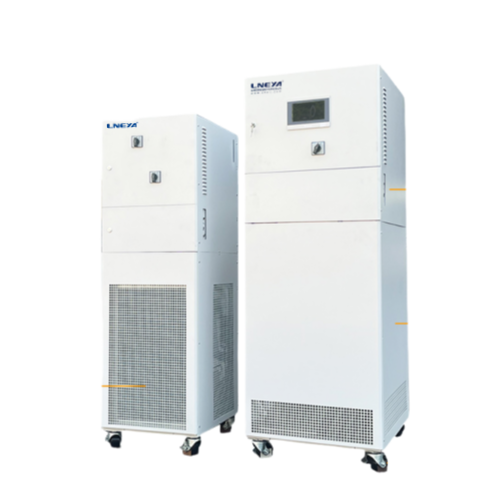Rumore forte del refrigeratore: cause e soluzioni
È normale che un refrigeratore produca un leggero rumore durante il normale funzionamento, ma un rumore troppo forte non solo compromette l'esperienza operativa, ma può anche indicare un potenziale guasto. Un rumore eccessivo può provocare lamentele da parte dei vicini o violare le normative ambientali locali e persino incorrere in multe. Se non si risolve il problema, si riduce la vita dell'apparecchiatura e si mette a rischio la sicurezza della produzione. Questo articolo presenta le fonti di rumore dei refrigeratori e come risolvere il problema del rumore eccessivo.
Correlato: Risoluzione dei problemi del refrigeratore
Suggerimenti
Se non siete professionisti con qualifiche adeguate, non smontate da soli componenti chiave come compressori e quadri elettrici per evitare guasti o incidenti di sicurezza.
Gamma di rumore normale
Il rumore del refrigeratore durante il funzionamento proviene dalla ventola, dal motore e dal compressore, ed è generalmente continuo e a bassa frequenza. La rumorosità della maggior parte dei refrigeratori è di 60-80 dB e il valore specifico varia a seconda del tipo di refrigeratore (raffreddato ad aria/ad acqua), delle dimensioni, dell'ambiente di installazione, ecc. Se il rumore diventa improvvisamente più forte e acuto, o è accompagnato da colpi, fischi e attriti metallici, spesso significa che l'apparecchiatura è anormale.
I motivi dell'elevata rumorosità dei refrigeratori
Il rumore dei refrigeratori è generalmente causato dai seguenti motivi:
Anomalia del compressore
Il pistone o la vite del compressore possono usurarsi dopo un funzionamento prolungato e il funzionamento sbilanciato provoca un aumento delle vibrazioni. Se il compressore manca di olio lubrificante o se l'olio lubrificante si deteriora, l'aumento dell'attrito causerà un rumore di attrito metallico. Problemi di aspirazione o di scarico possono causare una pressione anomala, con conseguente aumento del rumore.
Anomalia della ventola o della pompa dell'acqua
Le pale del ventilatore del refrigeratore raffreddato ad acqua sono sbilanciate o allentate e vibrano quando ruotano ad alta velocità, producendo rumori di battimento o acuti. La presenza di aria nel sistema di pompaggio produce un rumore di bolle d'aria. L'usura dei cuscinetti della pompa provoca un suono metallico acuto o un suono anomalo.
Anomalia del refrigerante
Il sovra o sottocarico del refrigerante influisce sullo stato di strozzamento della valvola di espansione e provoca un ululato ad alta frequenza. Se il refrigerante è miscelato con aria o umidità, le bolle possono scoppiare o gorgogliare durante il funzionamento.
Anomalia di installazione
Quando il refrigerante scorre attraverso tubi non fissati in modo sicuro, può colpire le pareti e produrre rumori di battito. Se non c'è un isolatore sismico tra il refrigeratore e il terreno, il suono delle vibrazioni sarà amplificato e trasmesso per risonanza. Quando il refrigeratore entra in contatto con le pareti o con altre strutture, il suono delle lievi vibrazioni viene amplificato.
Guasto al motore
L'invecchiamento della bobina interna del motore del sistema di refrigerazione, il rotore eccentrico o la regolazione impropria della velocità dell'inverter causano l'emissione di un suono elettromagnetico continuo.
A rumori diversi corrispondono anomalie diverse. Un giudizio preliminare sulla frequenza, sul ritmo e sul fatto che il rumore sia accompagnato da vibrazioni aiuterà a localizzare rapidamente il punto di guasto.
Soluzioni per il rumore forte
Manutenzione regolare
Sostituire regolarmente l'olio del compressore, controllare la lubrificazione dei cuscinetti e ridurre l'attrito meccanico. Controllare se il motore, la ventola e la pompa sono allentati o producono rumori anomali e ripararli o sostituirli in tempo.
Controllare la pompa dell'acqua e la ventola
Riequilibrare la girante del ventilatore e regolare il design del condotto dell'aria. Controllare la cavitazione della pompa, sfiatare il sistema e verificare se la porta di aspirazione è bloccata. Se necessario, sostituire la pompa a bassa rumorosità o il collegamento morbido per ridurre le vibrazioni di conduzione.
Controllare il refrigerante
Controllare il refrigerante Controllare se il condensatore e l'evaporatore sono bloccati per garantire la fluidità del sistema di refrigerazione. Se si mescolano impurità, è necessario sostituire il refrigerante e pulire a fondo la tubazione.
Installare dispositivi di assorbimento degli urti
Per isolare le vibrazioni, si possono utilizzare cuscinetti ammortizzanti in gomma o ammortizzatori a molla. È inoltre possibile installare cotone fonoassorbente e scatole fonoassorbenti, particolarmente adatte per ambienti interni o uffici. Disporre la direzione delle condutture in modo ragionevole per evitare angoli retti o lunghi tratti sospesi.
Aggiornamento del refrigeratore o dei componenti
I refrigeratori ad alte prestazioni sono generalmente dotati di compressori a bassa rumorosità, ventilatori silenziosi, sistemi di avviamento graduale del motore, ecc. Nella scelta dei modelli, è possibile dare priorità alla progettazione silenziosa in base ai requisiti di rumorosità in loco.
Se il problema di rumorosità non è ancora stato risolto dopo le indagini, si raccomanda di contattare l'assistenza tecnica del produttore del refrigeratore o il personale di manutenzione professionale.

Conclusione
LNEYA extremely silent chillers provide you with a good working environment. From design and production to installation, commissioning and maintenance, noise reduction is taken into consideration in every link. You can customize chillers with different noise levels at LNEYA. If you don’t know what noise level of cooling system is most suitable for you, we can help you make the most perfect solution based on local regulations, your installation environment and budget.
Raffreddatori correlati
FAQ
CONTATTO
TEL:TELEMATICO
EMAIL: EMAIL: EMAIL: EMAIL: EMAIL: EMAIL: EMAIL
WeChat e WhatsApp:

Wechat QR

Hai una domanda o hai bisogno di un preventivo? Compila il modulo qui sotto e il nostro team ti risponderà entro 24 ore.
 Refrigeratori industriali LNEYA Produttore Fornitore
Refrigeratori industriali LNEYA Produttore Fornitore














